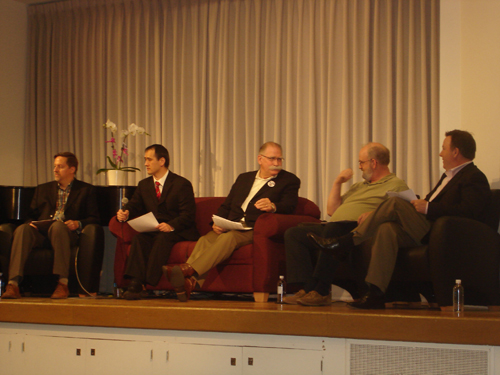Cade Metz reminds us that Google is the most virtuous collection of people on Earth in this love-letter in The Register
“This side of the argument said: We were pretty well known on the internet. We were pretty popular. We had some funds available. We could essentially buy prioritization that would ensure we would be the search engine used by everybody. We would come out fine – a non-neutral world would be a good world for us.”
But then that Google idealism kicked in.

Google’s Richard Whitt, George Ou, Data Foundry’s Ronald Yokubaitis, Richard Bennett, Vuze’s Jay Monahan
“The other side said: We were a company that was born and raised on innovation. We were born from the internet here in Silicon Valley. We were able to take for granted the fact that we could innovate on the network without permission from anybody – any broadband company, any potential gatekeeper of the network trying to tell us what to do. We could bring innovation directly to the users and let them sort out exactly what they wanted and what they didn’t want. Why would we muck with that? Why would we create haves and have nots on the internet?”
Naturally, Larry, Sergey, and the crew went the second option.
And clearly, Google had no commercial motive at all for its position.
What really happened is this: Google has invested hundreds of millions of dollars in server farms to put its content, chiefly YouTube, in an Internet fast lane, and it fought for the first incarnation of net neutrality regulations in order to protect its high-priority access to your ISP. In one server farm alone, they’re got 400,000 CPUs.
Now that we’re in a second phase that’s all about empowering P2P, Google has been much less vocal, because it can only lose in this fight. Good P2P takes Google out of the video game, as there’s no way for them to insert adds in P2P streams. So this is why they want P2P to suck. The new tools will simply try to convince consumers to stick with Google and leave that raunchy old P2P to the pirates.
The most amazing moment of the day came when Google’s Whitt attacked ISPs as “monopolies” when none has more than a 30% national market share. Later in the day, Yahoo announced it was outsourcing its search operations to Google, which gives them a 90% share.
But Google, you see, is a monopoly who hides behind its “don’t be evil” slogan, so whatever they want to say or do has to be cool with the rest of us.

I’m not so sure if Google really feels threatened by P2P since P2P cannot deliver a good on-demand streaming experience beyond 300 Kbps or whatever the common broadband upstream speed is. That’s the problem with out-of-order delivery from a bunch of peers that may or may not be there unless it had several times more seeders than downloaders. Since the normal ratio is several times more downloaders than seeders, you simply can’t do high-bandwidth in-order delivery of video. This is why you’re not seeing YouTube take a dive in popularity and every instant-play site uses the client-server CDN delivery model.
The main reason P2P is so popular is because there is so much “free” (read pirated) content available. The actual usability and quality sucks compared to commercial video on demand services. Not only do you get lower quality and lower bitrates in the 1 to 1.5 Mbps range, you have to wait hours for the video to finish before you can start watching it and it even hogs your upstream bandwidth in the process. Legal for-pay services such as Netflix all use the client-server CDN delivery model because it offers an instant play experience and the video quality is much higher quality at 4 Mbps. Other services like Microsoft’s Xbox Live Market Places use client-server CDN to deliver roughly 6.9 Mbps.
While it may be possible to get 6.9 Mbps from a P2P client, it’s rare that a single Torrent will be healthy enough to hit that speed and it certainly won’t arrive in order making it impossible to view while you download.
It’s interesting that on the very day that Yahoo announced they’re out-sourcing search to Google, which makes Google’s market share increase to 90%, the tech press is lulled into insomnia by Google’s newly-invigorated commitment to a principle nobody can define.
So let’s not take our eyes off the ball.